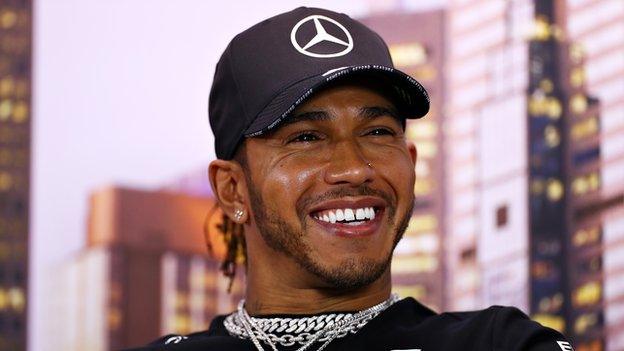Lewis Hamilton: F1 champion to set up commission to increase diversity in motorsport
- Published

Hamilton is a six-time F1 world champion
Lewis Hamilton has announced plans to set up a commission in his name to increase diversity in motorsport.
The world champion said he wants the Hamilton Commission to make "real, tangible and measurable change".
"Despite my success in the sport, the institutional barriers that have kept F1 highly exclusive persist," he said in a column for the Sunday Times. , external
"It is not enough to point to me, or to a single new black hire, as a meaningful example of progress."
Hamilton, 35, said his commission would explore how motorsport can be used "to engage more young people from black backgrounds with science, technology, engineering and maths (STEM) subjects".
He added: "Thousands of people are employed across this industry and that group needs to be more representative of society."
He said he wants motorsport "to become as diverse as the complex and multicultural world we live in".
It is the latest in a series of interventions by the Mercedes driver on issues to do with race since the death of the African-American man George Floyd in police custody in Minneapolis last month which has provoked global demonstrations behind the slogan "Black Lives Matter".
On Sunday, Hamilton attended a Black Lives Matter march in Hyde Park.
Hamilton has said he was "completely overcome with rage" at events in the USA.
Announcing his commission, which has been set up in partnership with the Royal Academy of Engineering, Hamilton said: "The time for platitudes and token gestures is over.
"It will explore areas including lack of role models and career services at schools, opportunities to engage more black youth with STEM extracurriculars, barriers that prevent people from more diverse backgrounds joining the racing industry, and problematic hiring practices that result in fewer black graduates entering engineering professions.
"This will not be arm's length research.
"We want to hear from the young people and graduates who deal with these challenges every day and we are in the process of bringing on additional partners who work on the ground in black communities to bring first-hand perspective.
"In addition, we want to bring in leaders from policy and business who are committed to leading on the activation of research recommendations."
Hamilton said he had "been fighting the stigma of racism throughout my racing career - from kids throwing things at me while karting, to being taunted by fans in black face at a 2007 grand prix".
He added: "I'm used to the idea that no one will speak up for me when I face racism, because no one personally feels or understands my experience. Most of the time, they don't even see it and if they do, they let their fear of saying the wrong thing get in the way.
"The unchanged make-up of the F1 community throughout my career makes it feel like only a certain type of person is truly welcome in this sport, one who looks a certain way, comes from a certain background, fits a particular mould and plays by certain unwritten rules.
"Even now, the media ask me different questions than they do my competitors and make accusations directly and indirectly — you're not British enough, not humble enough, not loved enough by the public."
And he explained why he called out fellow F1 drivers for not speaking out in the wake of Floyd's death, an intervention that prompted a number of other leading drivers to condemn racism, including Ferrari's Charles Leclerc, Renault's Daniel Ricciardo, McLaren's Carlos Sainz and the rising British stars Lando Norris and George Russell.
Hamilton said: "I saw people I respected choosing to say nothing and it broke my heart. It's why I had to speak out."